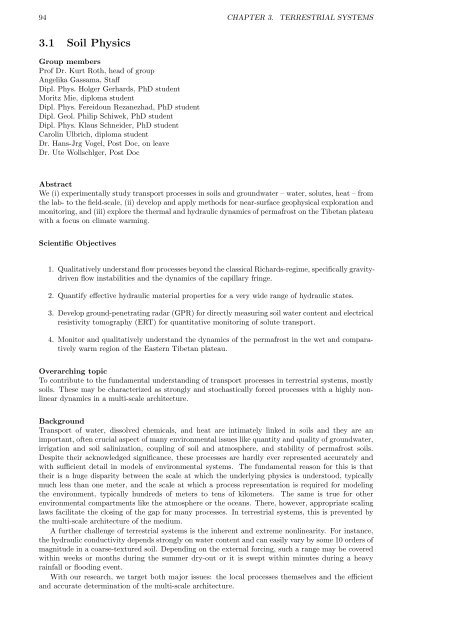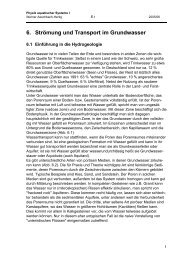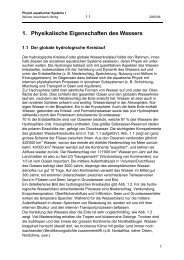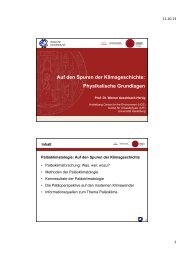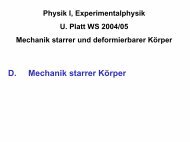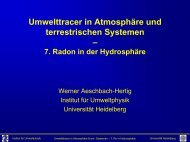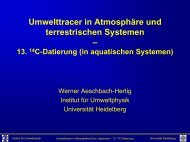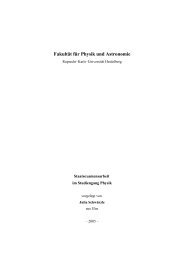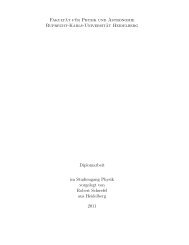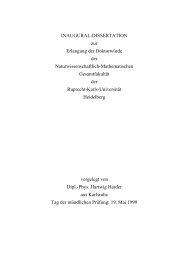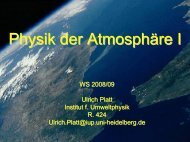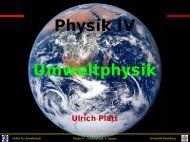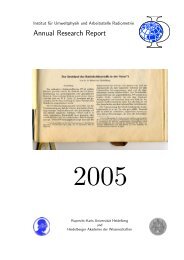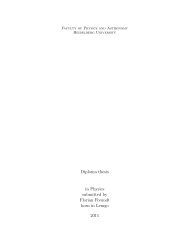download pdf - Institut für Umweltphysik - Ruprecht-Karls-Universität ...
download pdf - Institut für Umweltphysik - Ruprecht-Karls-Universität ...
download pdf - Institut für Umweltphysik - Ruprecht-Karls-Universität ...
Create successful ePaper yourself
Turn your PDF publications into a flip-book with our unique Google optimized e-Paper software.
94 CHAPTER 3. TERRESTRIAL SYSTEMS<br />
3.1 Soil Physics<br />
Group members<br />
Prof Dr. Kurt Roth, head of group<br />
Angelika Gassama, Staff<br />
Dipl. Phys. Holger Gerhards, PhD student<br />
Moritz Mie, diploma student<br />
Dipl. Phys. Fereidoun Rezanezhad, PhD student<br />
Dipl. Geol. Philip Schiwek, PhD student<br />
Dipl. Phys. Klaus Schneider, PhD student<br />
Carolin Ulbrich, diploma student<br />
Dr. Hans-Jrg Vogel, Post Doc, on leave<br />
Dr. Ute Wollschlger, Post Doc<br />
Abstract<br />
We (i) experimentally study transport processes in soils and groundwater – water, solutes, heat – from<br />
the lab- to the field-scale, (ii) develop and apply methods for near-surface geophysical exploration and<br />
monitoring, and (iii) explore the thermal and hydraulic dynamics of permafrost on the Tibetan plateau<br />
with a focus on climate warming.<br />
Scientific Objectives<br />
1. Qualitatively understand flow processes beyond the classical Richards-regime, specifically gravitydriven<br />
flow instabilities and the dynamics of the capillary fringe.<br />
2. Quantify effective hydraulic material properties for a very wide range of hydraulic states.<br />
3. Develop ground-penetrating radar (GPR) for directly measuring soil water content and electrical<br />
resistivity tomography (ERT) for quantitative monitoring of solute transport.<br />
4. Monitor and qualitatively understand the dynamics of the permafrost in the wet and comparatively<br />
warm region of the Eastern Tibetan plateau.<br />
Overarching topic<br />
To contribute to the fundamental understanding of transport processes in terrestrial systems, mostly<br />
soils. These may be characterized as strongly and stochastically forced processes with a highly nonlinear<br />
dynamics in a multi-scale architecture.<br />
Background<br />
Transport of water, dissolved chemicals, and heat are intimately linked in soils and they are an<br />
important, often crucial aspect of many environmental issues like quantity and quality of groundwater,<br />
irrigation and soil salinization, coupling of soil and atmosphere, and stability of permafrost soils.<br />
Despite their acknowledged significance, these processes are hardly ever represented accurately and<br />
with sufficient detail in models of environmental systems. The fundamental reason for this is that<br />
their is a huge disparity between the scale at which the underlying physics is understood, typically<br />
much less than one meter, and the scale at which a process representation is required for modeling<br />
the environment, typically hundreds of meters to tens of kilometers. The same is true for other<br />
environmental compartments like the atmosphere or the oceans. There, however, appropriate scaling<br />
laws facilitate the closing of the gap for many processes. In terrestrial systems, this is prevented by<br />
the multi-scale architecture of the medium.<br />
A further challenge of terrestrial systems is the inherent and extreme nonlinearity. For instance,<br />
the hydraulic conductivity depends strongly on water content and can easily vary by some 10 orders of<br />
magnitude in a coarse-textured soil. Depending on the external forcing, such a range may be covered<br />
within weeks or months during the summer dry-out or it is swept within minutes during a heavy<br />
rainfall or flooding event.<br />
With our research, we target both major issues: the local processes themselves and the efficient<br />
and accurate determination of the multi-scale architecture.


